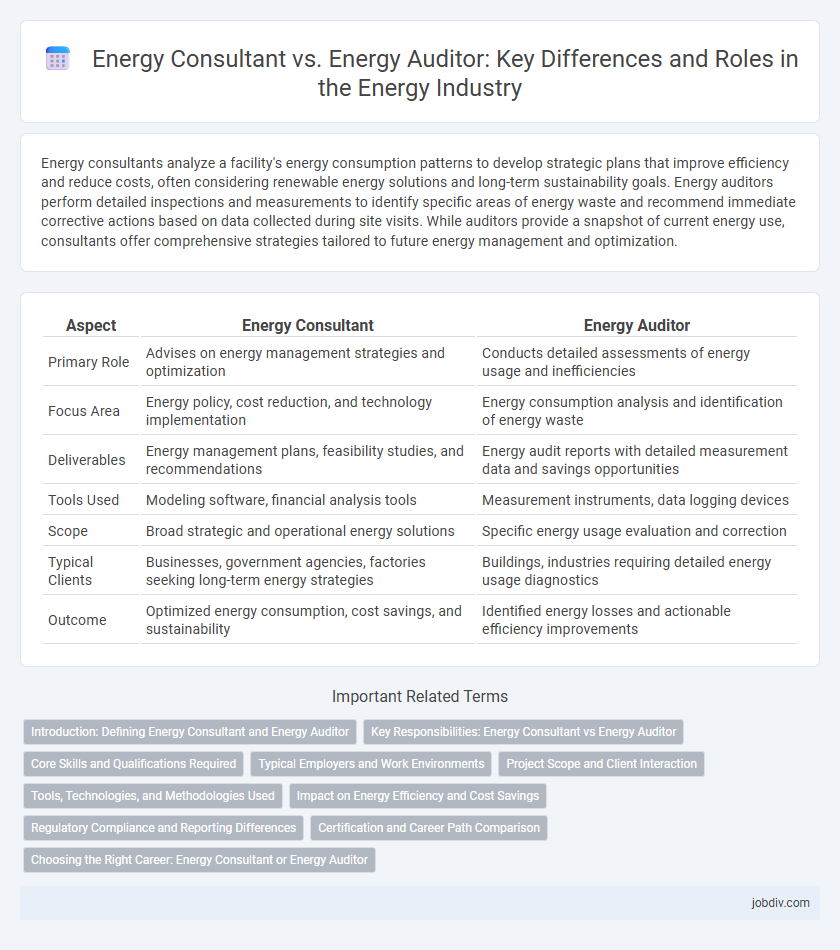Energy consultants analyze a facility's energy consumption patterns to develop strategic plans that improve efficiency and reduce costs, often considering renewable energy solutions and long-term sustainability goals. Energy auditors perform detailed inspections and measurements to identify specific areas of energy waste and recommend immediate corrective actions based on data collected during site visits. While auditors provide a snapshot of current energy use, consultants offer comprehensive strategies tailored to future energy management and optimization.
Table of Comparison
| Aspect | Energy Consultant | Energy Auditor |
|---|---|---|
| Primary Role | Advises on energy management strategies and optimization | Conducts detailed assessments of energy usage and inefficiencies |
| Focus Area | Energy policy, cost reduction, and technology implementation | Energy consumption analysis and identification of energy waste |
| Deliverables | Energy management plans, feasibility studies, and recommendations | Energy audit reports with detailed measurement data and savings opportunities |
| Tools Used | Modeling software, financial analysis tools | Measurement instruments, data logging devices |
| Scope | Broad strategic and operational energy solutions | Specific energy usage evaluation and correction |
| Typical Clients | Businesses, government agencies, factories seeking long-term energy strategies | Buildings, industries requiring detailed energy usage diagnostics |
| Outcome | Optimized energy consumption, cost savings, and sustainability | Identified energy losses and actionable efficiency improvements |
Introduction: Defining Energy Consultant and Energy Auditor
An Energy Consultant specializes in advising businesses and homeowners on optimizing energy use, implementing renewable solutions, and reducing utility costs through tailored strategies. An Energy Auditor conducts detailed assessments of buildings or facilities to measure energy consumption, identify inefficiencies, and recommend targeted improvements based on data analysis. Both professionals play critical roles in enhancing energy efficiency but differ in scope, with consultants focusing on strategic planning and auditors on technical evaluation.
Key Responsibilities: Energy Consultant vs Energy Auditor
Energy consultants analyze energy usage patterns to develop strategic plans for reducing consumption and enhancing efficiency across industrial or commercial facilities. Energy auditors conduct detailed on-site inspections and measurements to identify energy waste, verify utility bills, and provide accurate energy consumption reports. Both roles emphasize optimizing energy performance but differ as consultants focus on long-term strategy while auditors specialize in technical evaluation.
Core Skills and Qualifications Required
Energy consultants specialize in strategic energy management, requiring expertise in energy markets, sustainability practices, and regulatory compliance, often backed by certifications such as Certified Energy Manager (CEM) or LEED Accreditation. Energy auditors focus on detailed energy assessments, demanding strong analytical skills, proficiency in energy modeling software, and knowledge of building systems and energy codes, typically supported by credentials like Certified Energy Auditor (CEA) or BPI certification. Both roles require a solid foundation in mechanical, electrical, or environmental engineering principles, but consultants emphasize strategic planning while auditors prioritize technical diagnostics.
Typical Employers and Work Environments
Energy consultants typically work for engineering firms, environmental consultancies, and utility companies, offering specialized advice on energy efficiency and sustainability projects. Energy auditors are often employed by government agencies, insurance companies, and independent auditing firms, conducting detailed assessments of energy use and compliance with regulations. Both roles require fieldwork in commercial, industrial, and residential settings to analyze energy consumption patterns and recommend improvements.
Project Scope and Client Interaction
Energy consultants develop tailored strategies for optimizing energy use, focusing on long-term goals and integrating renewable solutions, while energy auditors conduct detailed assessments of current energy consumption patterns to identify immediate efficiency improvements. Consultants engage in collaborative client discussions to design comprehensive energy plans and ensure alignment with organizational objectives, whereas auditors interact primarily to collect data and report findings with recommendations for quick energy-saving measures. The project scope of consultants spans feasibility studies and policy advice, contrasting with auditors' focus on diagnostic evaluations and compliance checks.
Tools, Technologies, and Methodologies Used
Energy consultants leverage advanced software for energy modeling, simulation tools, and cost-benefit analysis platforms to develop strategic energy plans. Energy auditors utilize diagnostic instruments such as infrared cameras, blower doors, and data loggers to conduct on-site assessments and identify inefficiencies. Both professionals employ methodologies like benchmarking and life cycle analysis, but consultants focus more on predictive analytics while auditors prioritize empirical data collection.
Impact on Energy Efficiency and Cost Savings
Energy consultants analyze energy consumption patterns and develop strategic plans to optimize efficiency, reducing operational costs through tailored solutions and technology integration. Energy auditors perform detailed on-site assessments to identify inefficiencies and propose immediate corrective actions, enabling measurable cost savings through targeted improvements. Both roles drive significant energy efficiency advancements but differ in scope, with consultants focusing on long-term strategy and auditors on precise diagnostics.
Regulatory Compliance and Reporting Differences
Energy consultants provide strategic guidance on regulatory compliance, helping organizations navigate complex energy laws and standards to optimize sustainability efforts. Energy auditors conduct detailed assessments of energy use and efficiency, generating reports that document compliance with specific regulations and identify opportunities for improvement. Regulatory reporting by energy auditors is often mandatory, whereas consultants support ongoing compliance strategy and adaptation to evolving legal requirements.
Certification and Career Path Comparison
Energy consultants typically hold certifications such as Certified Energy Manager (CEM) or LEED Accredited Professional, emphasizing strategic energy planning and sustainability consulting. Energy auditors often obtain certifications like Residential Energy Services Network (RESNET) or Building Performance Institute (BPI), focusing on identifying energy inefficiencies through detailed building assessments. Career paths for consultants usually lead to roles in energy strategy and policy development, while auditors progress toward technical positions in energy analysis and compliance verification.
Choosing the Right Career: Energy Consultant or Energy Auditor
Energy consultants analyze market trends and develop strategic plans to improve energy efficiency for businesses, focusing on policy compliance and sustainability goals. Energy auditors conduct detailed onsite assessments to identify energy usage patterns and recommend practical measures to reduce consumption and costs. Choosing between these careers depends on whether you prefer strategic planning and client advisory roles or hands-on technical evaluation and reporting.
Energy Consultant vs Energy Auditor Infographic

 jobdiv.com
jobdiv.com